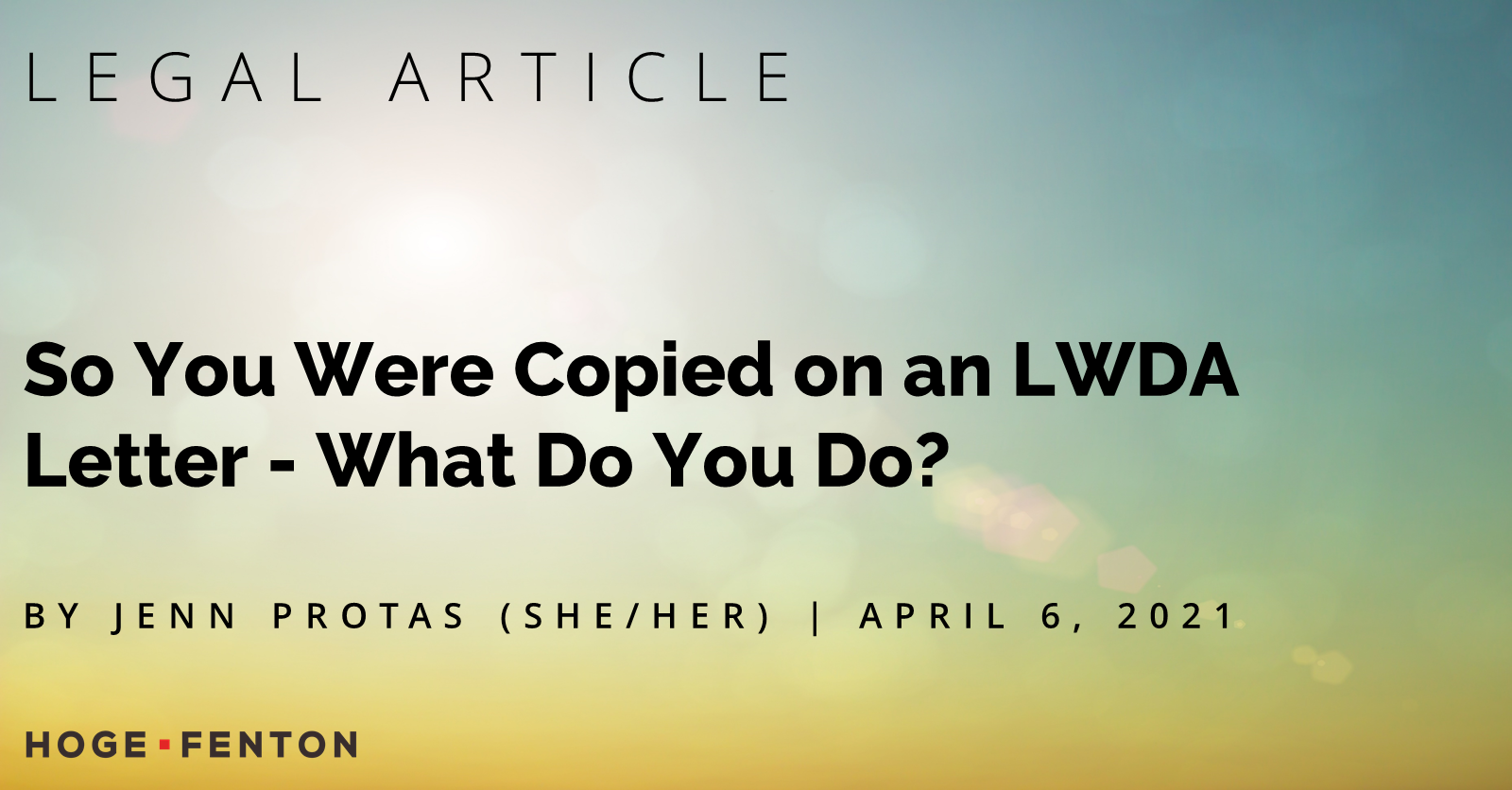So You Were Copied on an LWDA Letter – What Do You Do?
By Hoge Fenton | 04.6.2021 | Employment Law

When an employer receives a letter addressed to the Labor and Workforce Development Agency (“LWDA”) alleging various violations of the Labor Code, the employer frequently ignores the letter. However, the letter is an indication that a lawsuit will be filed against the employer. An employer that ignores this letter misses an opportunity to potentially cure violations (or, at least, prospectively address violations), respond to the allegations, and/or prepare for an impending lawsuit.
The letter is easy to overlook and ignore because:
- the letter is often not addressed to the employer (the employer is just copied),
- it often calls for no action by the employer, and
- the allegations are false (or, at least, the employer believes them to be).
This letter is a warning sign that a Private Attorneys General Act (“PAGA”) action (and potentially a class action) is being filed against the employer.
This article discusses:
- The Private Attorneys General Act
- The LWDA letter
- What you should do if you receive an LWDA letter
What is the Private Attorneys General Act?
When an employer violates provisions of the Labor Code, such as failing to provide non-exempt employees with compliant meal and rest periods, pay overtime, or include all required information on an employee’s itemized wage statement, an employee can sue an employer to seek damages intended to make the employee whole for those violations. The Labor Code also provides for civil penalties that the employer pays to the state. However, given limited resources, the state does not seek these penalties for most alleged Labor Code violations. Instead, the state created the Private Attorneys General Act to authorize employees to enforce the Labor Code on behalf of the employee, all other aggrieved employees, and the state. As an incentive, the aggrieved employees keep 25 percent of the recovered civil penalties; the remaining 75 percent of the recovered penalties go to the LWDA for enforcement of labor laws. This provides a clear incentive for employees—and their attorneys, who take a considerable share of the recovery as attorneys’ fees—to file PAGA actions against employers because even the penalties for hyper-technical “gotcha” violations that cause no harm to an employee can add up quickly.
Take the following example: Labor Code section 226 requires nine categories of information be included on employees’ itemized wage statements, including the legal employer’s name and address. Failure to include the employer’s address can result in a $250 penalty—per employee and per pay period—going back one year. So an employer with 100 employees that pays its employees on a weekly basis could face a penalty award of $1.3 million (52 pay periods x $250 per pay period x 100 employees) simply for failing to include the employer’s address on the itemized wage statement. The aggrieved employees could be entitled to $325,000 of that $1.3 million award.
PAGA actions are on the rise for several reasons:
- the employee incentive of recovering exorbitant penalties for minor violations,
- employees can easily file PAGA actions without the threat and expense of having to meet class action certification requirements, and
- PAGA actions cannot be waived or forced into arbitration.
So What is This LWDA Letter?
Before an employee may bring an action to recover civil penalties under the PAGA, the employee must give written notice by online filing to the LWDA and by certified mail to the employer of the specific provisions of the Labor Code that have allegedly been violated. It is common practice for an employee to merely copy the employer on the LWDA notice and send it without a cover letter. This is likely intentional on the employee’s part: the employee has a financial incentive to ensure the employer ignores the letter so the employer misses an opportunity to “cure.”
Upon receipt of the LWDA notice, the Labor and Workforce Development Agency must decide whether to investigate the allegations itself. Should the LWDA choose not to investigate the alleged violations, it must notify the employer and aggrieved employee that it does not intend to investigate the allegations within 60 calendar days of the postmark date of the notice. The aggrieved employee may commence a civil action in court for the penalties upon receipt of that notice or, if no notice is provided, within 65 calendar days of the postmark date of the notice.
What Should I Do If I Receive an LWDA Letter?
First and foremost, you should contact your employment law attorney. Among other reasons, there are a couple of violations that employers may “cure” to avoid civil penalties under PAGA. Where an employer has failed to include the inclusive dates of the pay period or the name and address of the legal employer on the itemized wage statements, within 33 days of the postmark date of the LWDA notice, the employer can “cure” the defect by providing “a fully compliant, itemized wage statement to each aggrieved employee for each pay period for the three-year period prior to the date of the written [LWDA] notice” and give notice to the aggrieved employee by certified mail and the LWDA by online filing. Although curing the wage statements is no small effort, if the employer successfully cures within the 33-day period, the employee cannot file a civil action for recovery of penalties for those violations, often reducing the potential exposure by hundreds of thousands of dollars.
Next, with your counsel, you should audit your itemized wage statements and your wage and hour practices, including your meal and rest periods, overtime pay practices, rounding of time, etc. Even for those errors that are not technically curable (i.e., you cannot fix them to avoid liability), you should consider whether to make necessary corrections. PAGA penalties continue to accrue through judgment or settlement. Correcting issues may limit exposure in the present case as well as protect you against future liability.
PAGA actions can be overwhelming and frustrating. Even the most conscientious of employers make mistakes, and, even if an employer is doing everything right, it cannot prevent employees from filing suit. Hoge Fenton’s employment law team has deep experience defending PAGA and class actions and is well-equipped to help employers respond to LWDA letters, PAGA actions, and class actions.
Meet Our Employment Law Group
 |
Jenn Protas helps employers navigate California’s numerous employment laws and defends employers with an eye toward successful, yet cost-effective resolution. Jenn is a committed advocate for her clients and a tenacious litigator. She defends employers on matters related to wage and hour law, wrongful termination, harassment, discrimination, and retaliation in single-plaintiff litigation, Private Attorney General Act actions, and/or class actions. Jenn’s practice also includes housing discrimination matters and business litigation. |
 |
Sarju Naran is a zealous advocate for his clients and approaches litigation with creativity and strategy. Chair of Hoge Fenton’s Employment Law Group, Sarju’s experience spans from representing middle-market and family-owned closely held businesses to large multi-national companies. He regularly litigates and provides advice and counsel to companies on wage and hour issues, trade secret misappropriation, employee mobility, wrongful termination, performance management, and leaves of absence. |
 |
Maysa Saeed is an associate attorney whose practice focuses on employment counseling and litigation and assists clients in all aspects of employment law. Prior to joining Hoge Fenton, Maysa was a litigation associate with experience litigating various commercial, employment, and real estate matters. Maysa’s prior legal experience also includes defending insurance carriers in administrative trials before the Workers’ Compensation Appeals Boards in San Jose and Salinas. |
This information is provided as an educational service by Hoge Fenton for clients and friends of the firm. This communique is an overview only, and should not be construed as legal advice or advice to take any specific action. Please be sure to consult a knowledgeable professional with assistance with your particular legal issue. © 2021 Hoge Fenton










